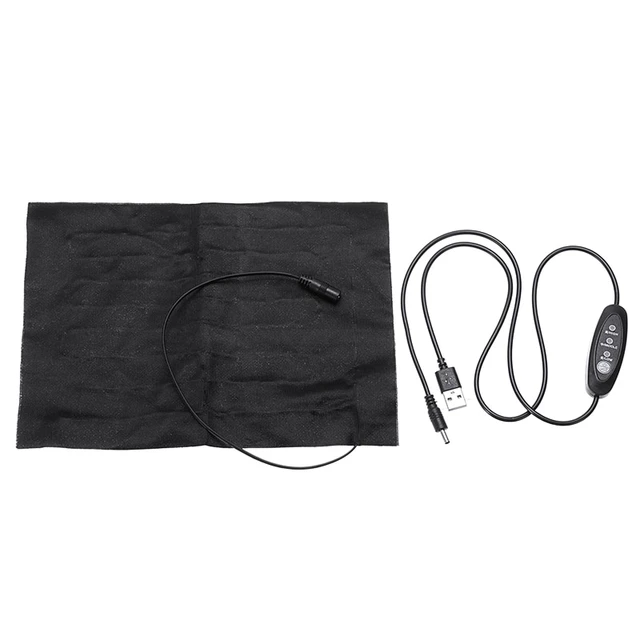Introduction
USB heat pads are convenient and portable devices that provide warmth and comfort for various purposes. Whether you want to soothe muscle aches, relieve menstrual cramps, or simply stay warm during colder days, understanding how to use a USB heat pad properly is essential. In this guide, we will provide a step-by-step guide on how to use a USB heat pad effectively and safely.

How do I use a USB heat pad?
Step 1: Choose the Right USB Heat Pad
1.1. Consider Your Needs
Determine the purpose for which you will be using the USB heat pad. Different heat pads are designed for specific uses, such as neck and shoulder pain relief, back pain relief, or general warmth. Select a heat pad that is suitable for your intended use.
1.2. Check the Specifications
Review the specifications of the USB heat pad before purchase. Ensure that it is compatible with the power source you will be using (e.g., laptop, power bank) and that it provides the desired level of heat intensity.
Step 2: Prepare the USB Heat Pad
2.1. Inspect the Heat Pad
Before using the USB heat pad, carefully inspect it for any visible damage or defects. Make sure that the wires, connectors, and heating elements are intact and not frayed. Discontinue use if you notice any signs of damage.
2.2. Unfold or Unroll the Heat Pad
If the USB heat pad is foldable or comes in a rolled format, unfold or unroll it to its full size. Ensure that the heating elements are spread evenly across the entire surface.
2.3. Locate the USB Connector
Identify the USB connector on the heat pad. It is usually located at one end of the pad and is designed to be plugged into a USB power source.
Step 3: Powering the USB Heat Pad
3.1. Find a USB Power Source
Locate a suitable USB power source, such as a laptop, desktop computer, USB wall adapter, or power bank. Make sure the power source is functioning properly and has an available USB port.
3.2. Plug in the USB Connector
Insert the USB connector of the heat pad into the USB port of the power source. Ensure a secure connection to prevent accidental disconnection during use.
3.3. Power On the USB Heat Pad
Once the USB connector is plugged in, power on the heat pad using any available control mechanisms, such as an on/off switch or temperature control button. Refer to the user manual or instructions provided with the heat pad for specific guidance.
Step 4: Adjusting Heat Settings (if applicable)
4.1. Check for Heat Settings
Some USB heat pads offer adjustable heat settings to suit individual preferences. Familiarize yourself with the available settings, such as low, medium, and high, or specific temperature ranges.
4.2. Set the Desired Heat Level
Select the desired heat level based on your comfort and the purpose of use. Start with the lowest setting and gradually increase if needed. Remember that individual heat tolerance may vary, so adjust accordingly.
Step 5: Applying and Using the USB Heat Pad
5.1. Positioning the Heat Pad
Place the heat pad onto the desired area of your body or the object you wish to warm. Ensure that the heating elements are in direct contact with the targeted area for effective warmth distribution.
5.2. Securing the Heat Pad (if necessary)
If the USB heat pad comes with straps, fasteners, or adjustable attachments, use them to secure the pad in place. This will prevent it from shifting or falling off during use.
5.3. Monitor Sensations and Comfort
Pay attention to your body’s response to the heat pad. Adjust the heat settings or reposition the pad if you experience any discomfort, excessive heat, or skin irritation. It is important to prioritize safety and well-being during use.
Step 6: Safe Usage and Precautions
6.1. Follow Manufacturer’s Instructions
Always refer to the manufacturer’s instructions and safety guidelines provided with the USB heat pad. Different models may have specific usage instructions and precautions that need to be followed.
6.2. Avoid Prolonged Use and Overheating
To prevent overheating or potential damage, avoid using the USB heat pad continuously for extended periods. Follow the recommended usage duration specified by the manufacturer and give your body regular breaks from heat exposure.
6.3. Do Not Sleep with the Heat Pad
It is not recommended to sleep with the USB heat pad in place. Unplug the heat pad and remove it before sleeping to minimize the risk of burns, overheating, or accidental damage.
6.4. Unplug After Use
Always unplug the USB heat pad from the power source when it is not in use. This will prevent unnecessary power consumption and reduce the risk of accidents or damage to the heat pad.
Conclusion
USB heat pads are versatile and convenient devices for providing warmth and comfort. By selecting the right heat pad, preparing it properly, connecting it to a USB power source, adjusting the heat settings, and applying it correctly, you can effectively enjoy the benefits of a USB heat pad. Remember to prioritize safety, follow manufacturer’s instructions, and monitor your comfort levels during usage. With proper usage and precautions, a USB heat pad can be a valuable tool for relaxation, pain relief, and keeping warm in colder environments.

